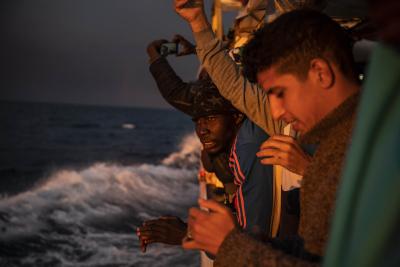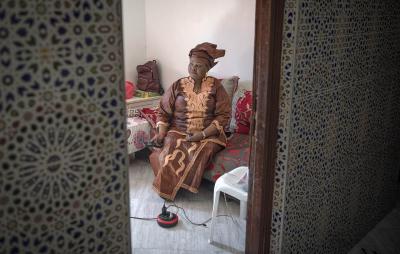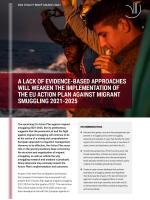A lack of evidence-based approaches will weaken the implementation of the EU Action Plan against migrant smuggling 2021-2025

The upcoming EU Action Plan against migrant smuggling 2021-2025, like its predecessor, suggests that the prevention of and the fight against migrant smuggling will continue to be at the centre of a strong and comprehensive European approach to migration management. However, to be effective, the Action Plan must rely on the growing evidence-base concerning the structure and organization of migrant smuggling, as well as rethink the way smuggling research and analysis is produced. Doing otherwise may seriously impact the Action Plan’s implementation and outcomes.
- Demand that gender, race and class perspectives are present in smuggling and counter-smuggling research and analyses in ways that identify the wider impact of EU actions on communities in countries of origin, transit and destination and within the EU.
- Include the perspectives of third-country, junior and female researchers, scholars and policy analysts, and involve stakeholders and informants beyond those typically reached out to during research, policy making or knowledge generating processes.
- Create an open access database that includes examples of smuggling caselaw and legislation that showcase the impact of EU law enforcement agencies’ counter-smuggling efforts in transit, destination and origin countries and within the EU to demonstrate clear efforts towards transparency and accountability.
As part of the new Pact on Migration and Asylum, the European Commission has announced it will present the EU Action Plan against migrant smuggling 2021-2025 in the first quarter of 2021. The new Action Plan, which builds on the 2015-2020 version, has been developed in line with the European agenda on migration and security. Both agendas identify migrant smuggling as a factor undermining orderly migration management, characterizing it as exploitative and its facilitators as 'showing little respect for human life in the pursuit of profit.’ Citing an often-quoted statistic by Europol concerning irregular migration into Europe which claims that around ninety percent of those who cross the EU’s borders do so with the assistance of migrant smugglers, the Commission defines migrant smuggling as an inherently criminal practice, and its facilitators as organized into resilient and adaptive networks that rely on the latest technologies to partner with other criminal groups to carry out vicious crimes against migrants.
On 1 March 2020, the Commission opened to public comment the roadmap to the EU Action Plan against migrant smuggling 2021-2025. While acknowledging as the roadmap notes, that the final content of the action plan may change from its current language, the forthcoming version of the EU action plan does not seem to diverge radically from its 2015-2020 iteration. Instead, it indicates a clear intention to continue pursuing the strategy outlined in the previous action plan. This involves relying on EU member states and EU law-enforcement agencies to investigate and prosecute migrant smuggling networks, as well as strengthen cooperation with third countries of origin and transit along migration routes towards the EU in order to combat migrant smuggling.
Beyond migrant-smuggling networks
Smuggling facilitators are not only men. The facilitation of migrants’ journeys is often the result of community-based efforts that include women, young people and children.
This policy brief recognizes the Commission’s intention to counter migrant smuggling networks as part of broader efforts to contain irregular migration. However, it also urges policy-makers to reconsider the claims made concerning the organization and structure of migrant smuggling that are evident in both the 2015-2020 and the 2021-2025 Action Plans. This recommendation is based on clear evidence that, far from pertaining solely to the domain of transnational criminal networks, the facilitation of irregular migration in third countries and into the EU involves increasing and diverse numbers of people (including women, young people and children), who operate at the local level to overcome longstanding socioeconomic disparities often compounded by race and gender-based discrimination. While many do in fact benefit financially from their actions, they often do so in limited ways and not with criminal intent, their profits being almost immediately recirculated into their communities, which coincidentally often exist in highly marginalized locations.
Furthermore, data also show that, rather than being organized by smuggling facilitators alone, irregular journeys, particularly across North Africa, increasingly involve efforts facilitated by migrants themselves, their friends or family members, often as a result of their very inability to cover smuggling fees (see further reading). While the increase in the number of irregular arrivals to Italy and Spain in 2020 suggests that many of these journeys may be ultimately successful, it is also highly likely that many of these self-organized efforts end in tragedy. Although acknowledged to be an undercount, data from IOM’s Missing Migrants Project reports that in 2020 alone 1417 people died while attempting to cross the Mediterranean.

The limitations of the criminal network approach
Although labelled as criminal or exploitative in nature, mobility facilitation and migrants’ transits often constitute an important part of the livelihoods of marginalized groups and people.
None of the prior statements seeks to deny the existence of the vast range of organized, violent and predatory practices that migrants endure at the hands of smuggling facilitators, gangs, government officials or ordinary people along the migration pathway. A vast body of policy and academic literature has documented in harrowing detail the experiences of migrants during their journeys. Yet continuing to privilege the criminal network approach in discussions concerning the facilitation of irregular migration carries the danger of obscuring critical elements involving the interactions between migrants and those who facilitate their journeys. For example, the emphasis on criminal networks has systematically concealed the experiences of people who unable to afford smuggling services, must develop alternatives in order to ensure their mobility, among which women, young people and children figure prominently. The criminal network trope has also hidden the challenges experienced by growing numbers of communities along the migration pathway, who virtually overnight, and as part of EU efforts to curtail irregular migration in collaboration with third countries of origin and transit, have seen their livelihoods as transporters and traders become designated as migrant smuggling. This has condemned many men, women and children to destitution, or led them to pursue what may be lucrative options as smuggling facilitators, yet placing migrants and themselves at risk.
The evidence and research identifying smuggling dynamics outside of those under the criminal network framework has grown in recent years. This has been the result of pressing questions concerning the lack of data on smuggling and counter-smuggling efforts, and the realization that said framework fails to account for the impacts of EU-financed actions against smuggling on communities across countries of both origin and transit.
This body of work has also raised concerns over the tendency of EU policy insights and decision-making concerning smuggling to be Eurocentric in nature, and to be often based on the perspectives of a rather specific body of commentators and analysts, who are in turn also prone to endorse criminal justice and EU perspectives. As many scholars have shown, this has led to the mere reproduction of already existing explanations and theories concerning smuggling, and to official insights on smuggling to remain vastly un-scrutinized, their effects on policy and practice to stay critically unexamined, and their impacts on the everyday lives of people to become invisibilized.
Further reading
DIIS Report 2021: Does information save migrants' lives? Knowledge and needs of West African migrants en route to Europe by Ida Marie Savio Vammen, Sine Plambech, Ahlam Chemlali and Ninna Nyberg Sørensen

